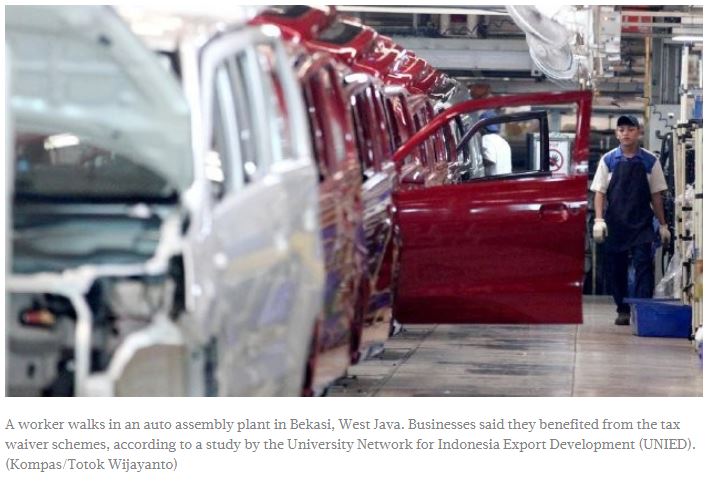Indonesia: Exporters want to see tax waivers continued: Survey
Exporters are hoping the current tax waivers will be continued, with half of respondents surveyed by the University Network for Indonesia Export Development (UNIED) saying they had benefited from the schemes.
The first scheme, the tax waiver for imported materials for exports (KITE), exempts eligible companies that do not operate in bonded zones from paying value-added tax (VAT) and luxury goods tax (PPnBM) as well as excise fees on capital goods or intermediary goods they import for export purposes.
The second scheme automatically exempts companies that operate in bonded zones from paying these taxes.
In its research, the UNIED interviewed 1,606 businesses that had benefitted from either the regular bonded zone or KITE schemes. The study found that 50 percent of respondents believed the schemes had helped improve their production efficiency.
Should the government decide to revoke these schemes, 32 percent of respondents said they would move their operations abroad, mostly to Vietnam.
Among those that operate in bonded zones, textile, electronics and footwear manufacturers would be the most likely to relocate if the incentive was stopped.
For those operating under the KITE scheme, the most likely to move overseas would be textile and automotive manufacturers as well as manufacturers of foodstuffs, plastic, wood and paper.
The UNIED was established by government-backed export financing company LPEI, also known as Indonesia Eximbank, in partnership with 11 state colleges.
At a recent launch of the study in Jakarta, Indonesian Exporters Association (GPEI) chairman Benny Soetrisno said the two incentives had helped businesses, particularly in managing their cash flows.
However, he said greater inter-ministerial coordination would be required if the country wanted to increase its export output. Support from technical ministries, such as the Trade Ministry, among others, would be a great help in unlocking overseas market access, he said.
“There should be intense cooperation among ministries,” he said, suggesting that the government should provide further support for exporters, such as by providing export insurance.
While expressing appreciation for the KITE scheme, Edward Otto Kanter, an advisor at the Association of Priority Lane Companies (APJP), said some businesses had been hurt by the government’s import-restriction policy, which raised the income tax on 1,147 imported consumer goods.
“The regulation is quite a burden for businesses that utilize the KITE scheme as some of the [imported capital or intermediary] goods are subject [to higher income tax],” said Edward, calling for the government to exempt KITE-based businesses from the regulation.
Responding to these concerns, Finance Minister Sri Mulyani Indrawati said the government could give special treatment to KITE businesses by exempting them from the regulation. This is because these companies import goods for manufacturing purposes, while the regulation is aimed at reducing imports of foreign-made consumer goods.
The UNIED study found that the value created from both schemes totaled Rp 57.28 trillion (US$ 4.09 billion) in 2017, and helped facilitate the export of Rp 780.8 trillion in goods over the same year.
The incentives also helped attract Rp 178.17 trillion in investment in 2017, with these businesses employing 1.95 million people in the same year, 97 percent of whom were Indonesians.
Thirty-four percent of the Indonesian goods exported in 2017 were manufactured using the capital or intermediary goods that were subject to the incentives, the research showed.
The schemes also contributed Rp 85.49 trillion to the government’s tax revenue in 2017, up from Rp 64.96 trillion in 2016, according to the study.
The study found that more than 95,000 small and medium enterprises (SMEs) were indirect beneficiaries of the incentives, as they formed networks with companies that operated in bonded zones or used the KITE scheme.
Responding to the study, Sri Mulyani hinted that the schemes were unlikely to be revoked as they had created significant greater economic value, in the form of increased exports, investment, job creation and the multiplication of linkages among sectors.
Source: https://www.thejakartapost.com/news/2019/02/27/exporters-want-to-see-tax-waivers-continued-survey.html


 English
English




